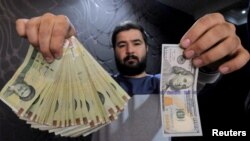Economic experts say Iran has the potential to expand its economy and become more prosperous now that many economic sanctions have been lifted. But some of these same economists worry that corruption and government intrusion into the markets will hurt growth and disappoint ordinary Iranians.
The Chief of Staff of Iran’s Presidency says businesses see his nation as a promising emerging market. Mohammad Nahavandian says many major companies “have expressed interest” in Iran’s energy sector, transit routes, airlines and other businesses.
A published report says Iran’s $90 billion stock market could attract another billion dollars of investments over the next six to eight months. U.S. Secretary of State John Kerry says Iran now has to access about $55 billion that was once tied up by sanctions. While that is a lot of money, it is just a fraction of the hundreds billions of dollars he says Iran needs in coming years to modernize the energy sector, water infrastructure and other facilities. Investment and maintenance in those areas was deferred by sanctions.
Energy first
Economist Gary Hufbauer says the most obvious area of expansion in the new post-sanctions environment is Iran’s vital energy sector. The Peterson Institute for International Relations scholar says investment is most likely to come from Western European nations like France, Germany and Italy, which have had long-standing business ties with Iran. He says Russia has close relations with Iran, which could help investors, and India has many entrepreneurs who know Iran well.
In a VOA interview, Hufbauer speculated that Japanese investors, who were badly hurt by sanctions, will be cautious about returning to Iran. He expects U.S. companies will sell things like aircraft or consumer goods to Iran, but will be slow to invest in facilities inside that nation because some sanctions remain in place, and others might be re-imposed.
He calls the possibility of a “more normal” economy with growing businesses and an expanding economy “optimistic.” Hufbauer says Iran is hurt by widespread corruption that makes it difficult to attract the foreign investment and partners that could bring capital and expertise to help the economy grow more quickly. Hufbauer and other experts also worry that government interference in the economy, such as limiting imports or subsidizing local products, is likely to slow growth.
Economist Michael Rubin says the “odds are not in favor” of Iran making the kinds of free market reforms that have lifted "two billion people out of poverty" over the past couple of decades around the world. The American Enterprise Institute scholar says too many of Iran’s politicians favor state control of the economy. He says that approach has produced poor results so far.
In a VOA interview, Rubin says the Iran Revolutionary Guards play a huge and powerful role in the economy. He says it is as if in the United States a part of the U.S. Army “merged with (huge, multinational corporations like) Bechtel, KBR, Halliburton, Northrup Grumman…Boeing… and ExxonMobil.”
Another problem, according to Rubin, is that the billions of dollars freed up by the sanctions' end could be diverted from uses that expand the economy to other areas, such as the military, which could spark inflation and hurt ordinary Iranians. He says economic missteps might spark unrest.
Expanding Iran's economy
Hufbauer says ordinary Iranians could be helped by efforts to expand the nation’s economy beyond the oil sector. He says Iran could use its abundant hydrocarbon resources to expand a plastics manufacturing industry, though that might require some foreign help and investment.
He says Iran’s highly-educated workforce could also develop software businesses, particularly if some of the many engineers who have been working on military and nuclear projects bring their talents to this area. The economist also says Iran could renew its previous business of assembling cars and continue its traditional export of finely-crafted rugs.
Hufbauer says when sanctions made imports difficult, Iran’s manufacturing sector turned out all kinds of merchandise from socks to home appliances. He says there is likely to be a “huge sorting out” to see which of these businesses can survive a new, post-sanctions era that is likely to include competition from imports that are often cheaper.
In the meantime, a study by the International Monetary Fund says Iran’s economy will grow little if at all this year, but predicted the end of sanctions and declining costs of doing business could help growth rise to four percent or higher next year.
Hufbauer says an expanding economy could encourage Iran’s middle class to speak up for stability rather than putting resources and political capital into foreign adventures. But Rubin says a more prosperous future is far from certain.





